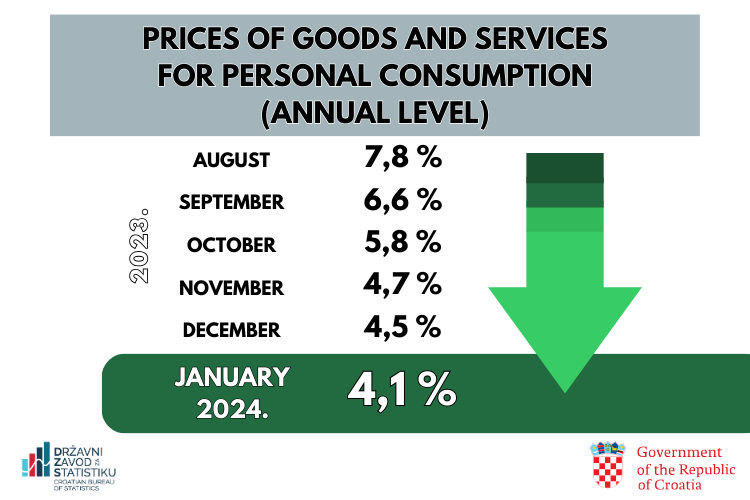- Published: 01.02.2024.
PM Plenković: Statistics for January show continuation of slowdown inflation trend
Prime Minister Andrej Plenković said today that data from the national statistical office for January 2024 show the continuation of the trend of decreasing inflation, while the government is protecting citizens' standards with strong measures.
The national statistical office (DZS) published its flash estimate according to which Croatia's inflation rate in January 2024, measured by the Consumer Prices Index, slipped to 4.1% compared to January 2023, while compared to the previous month, that is, December last year, it fell by 0.4 percentage points.This slowed down the growth of consumer prices on an annual basis, given that in December 2023, inflation amounted to 4.5%. The rate of 4.1% is the lowest inflation rate since October 2021, when it was 3.8%.
"According to a flash estimate of the DZS, inflation slowed down to 4.1% on an annual basis in January, which is the lowest inflation rate since October 2021. With strong government measures, we are protecting the standard of Croatian citizens with the ongoing trend of reducing inflation," the Prime Minister announced on the X social media platform.
Minister Habijan: Croatia's inflation eases owing to government's consistent policy
Economy and Sustainable Development Minister Damir Habijan said that a further easing of inflation in January is a consequence of the government's consistent policy, recalling the European Commission's estimates that inflation in Croatia in 2024 should be among the lowest in the EU.
"Inflation shows a further decelerating trend on an annual basis, and a downward trend on a monthly basis, so I think this is very good news," Habijan said.
The slowdown in inflation, he said, is also a consequence of the government's consistent policy, through a package of assistance to households and and the enterprise sector, including limiting the prices of electricity, gas and fuel. The "14 months of consecutive decline" in the inflation rate also shows that this policy is the right one and good.
In comparison with the eurozone members, Habijan stated, the drop in inflation at the monthly level of 0.3 percentage points is greater than in ten eurozone member states. If the data for Croatia are compared with the EU member states that are not in the eurozone, then the inflation rate in those countries, such as Bulgaria, Romania, Hungary, Poland and the Czech Republic, is much higher, said Habijan.
Asked about the expectations of the inflation trend with regard to the coming tourist season, Habijan said that he believes in the projections of the European Commission, which certainly takes into account a higher consumption during the tourist season.
According to these estimates, inflation in Croatia in 2024 will be around 2.4%, which is the third lowest estimated rate for the countries of the bloc, the minister pointed out.
Price cap for certain products remains in force for the time being
Despite the more favorable inflationary trends, Habijan said that for the time being, the price cap on thirty products set by the government remains in force.
He also said that, according to the data of three retail chains that submit data to the ministry, as of yesterday, the basic consumer basket recorded an average price drop ranging between 8.5% to 3.3%.
Text: Hina
